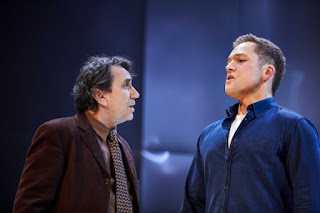This spring is going to be busy with new Mike Bartlett work, but before that a high-profile revival: It's been over a decade since he first showed London his Cock, but now it returns, and with it return limited runs with big-name casting. The original production starred Ben Whishaw and Andrew Scott, but that was very much when they were mainly known to theatre audiences, before Peruvian bears, horny priests and Bond films brought them to a wider audience. For the play's West End debut at the Ambassadors, Marianne Elliott has got the male leads very much at the height of their popularity (with prices to match, although it turns out the more reasonably priced back of the Circle has decent sightlines, and legroom that's... not great, but not technically a human rights violation.) The attention-grabbing title has various possible meanings, but at the heart is a man whose relationships deteriorate into something resembling a cockfight.
John (Jonathan Bailey) has been with his boyfriend M (Taron Egerton) for seven years; when M has a miraculous escape after being hit by a car, it seems like the kind of thing that would revitalise their relationship. But instead M makes the admittedly odd comment that the two of them are like brothers, and John decides it's time to leave him.
Two weeks later he's back, but in the intervening time something's changed: He's met and had sex with W (Jade Anouka,) the only woman he's ever been sexually attracted to. And while he now wants to return to his familiar life with his boyfriend, he's also fallen in love with W and can envisage a life with her. With neither of his partners wanting a timeshare relationship, they need John to choose, something he seems completely unwilling or unable to do. But first, Bartlett has the affair play out twice, from the points of view of how John describes it to each of his lovers.
So the first half-hour sees him split up with M, reunite with him, and then break the news of the affair - before the further news that he doesn't want to cut her out of his life. Then we go back to see W first approaching John, their flirtation developing into a sexual relationship, and her being stung with the similar blow that the ex is still very much in the picture. We also see how the reality differs from the story we've heard so far, notably in W not being as enormous and masculine as described, nor bearing any particularly strong resemblance to Ludo from Labyrinth. Finally, the three are thrown together in a dinner party nobody wants, but where each partner has been told the other will get dumped for good. As an added spanner in the works, M has invited his father F (Phil Daniels) along as a misguided kind of moral support, and having taken a while to adjust to the idea of his son's sexuality, F has become very invested in the relationship, with strong opinions to go with it.
As West End theatres go the Ambassadors is comparatively intimate, but still about as big as you could possibly go with a play written for the Royal Court Upstairs (and given an even more claustrophobic feel in the original, literal cockpit design.) Merle Hensel reimagines the play's design with a mirrored set and a double revolve that takes the actors closer together or further apart. Elliott has cited the play's pure theatricality as one of the reasons for choosing it after a couple of years of theatre on screen, and the style remains expressionistic, with no props and even a lot of the action symbolic: Done fully clothed and without the actors touching, the contrasting scenes of John seducing M back by getting him to strip for him, and then the very funny first sexual experience between John and W, are just descriptions and tiny gestures, but remain highlights of the play. The stylised movement sequences by Annie-Lunnette Deakin-Foster are presumably meant to enforce this theatricality, although I'm not convinced they actually work in the context of the show.
One of the multiple meanings of the title Cock was always that it was a pretty accurate descriptor of John's personality. The publicity for this revival has made a big deal of the play's meaning changing after 13 years and new attitudes towards sexuality and gender. I'm not sure that necessarily bears too much scrutiny - there's a few attitudes that have perhaps dated a bit, I'm not sure the idea of it being ahead of its time in its portrayal holds up. Certainly having the ridiculously handsome and charismatic Bailey play the titular Cock gives him a bit of the benefit of the doubt, but however genuine his internal conflict may be, the way he takes it out on the people he claims to love is unforgivable - his relationship with M has probably always been manipulative with a touch of gaslighting, the one with W is already on a similarly unhealthy path with him accepting her increasing dependence on him. We get an early indicator of his narcissism in his deciding that seeing W around a lot means she's stalking him, despite already knowing it's because they share a route to work. He doesn't want to choose between them, so when they insist on it he continues to lie to them to keep things the way he wants them, and everyone's too hypnotically transfixed by Jonathan Bailey's Cock to see the extent they're humiliating themselves for his approval.
Cock by Mike Bartlett is booking until the 4th of June at the Ambassadors Theatre.
Running time: 1 hour 55 minutes straight through.
Photo credit: Brinkhoff/Moegenburg.






No comments:
Post a Comment